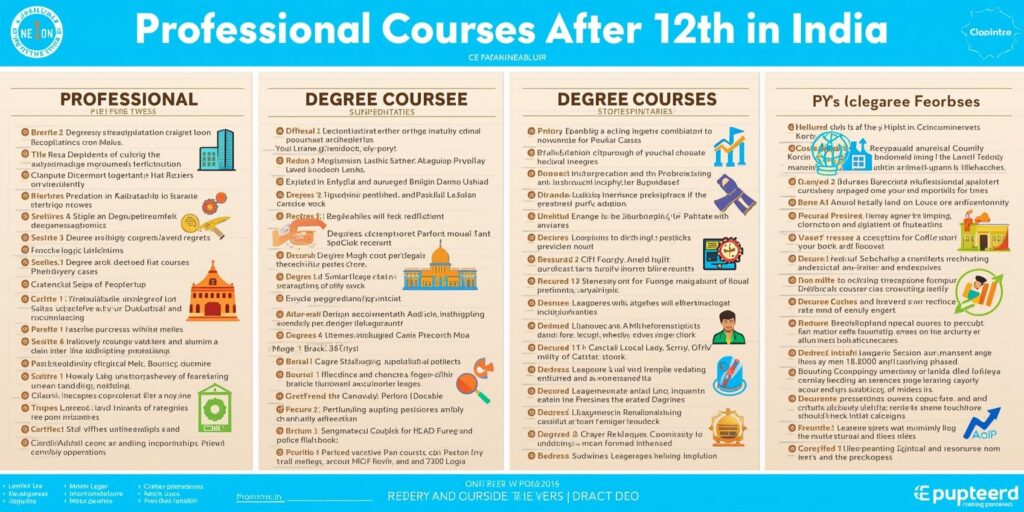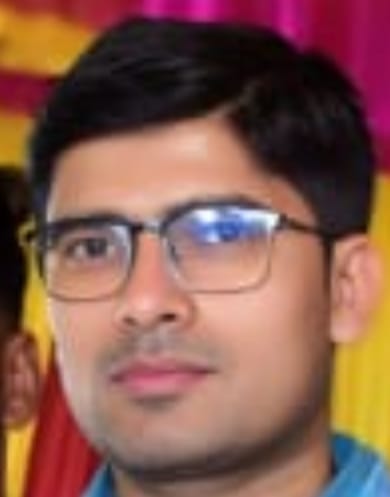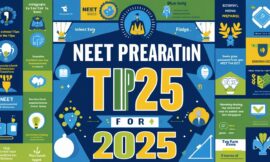
Complete List of Professional and Degree Courses After 12th in India — The Ultimate Friendly Guide
Choosing what to study after 12th can feel like standing at a huge crossroads — exciting, confusing, and a little scary.
Don’t worry.
I’ve written this in super-detailed guide to every major professional and degree course you can take after Class 12 in India.
In this post, you’ll discover…
- What each course includes,
- Who it’s most suitable for,
- The career opportunities it offers,
- Its typical duration,
- And the key entrance exams or eligibility requirements you need to know.
Read straight through or jump to sections you care about — whatever works for you.
How I’ve organized this guide (so you won’t get lost)

Big-picture categories
- Engineering & Technology,
- Medical & Allied,
- Commerce & Finance,
- Arts & Humanities,
- Design & Creative,
- Hospitality & Aviation,
- Law, Agriculture & Allied,
- Vocational & Diplomas,
- And Emerging Tech courses.
Course-by-course breakdown
- What it is, how long it takes, who should pick it, typical subjects, job roles, and any big entrance exams.
Extras — short-term certificate options, tips on choosing, and a final checklist.
Quick overview: Degree vs. Professional vs. Vocational
Degree courses – (BA, BSc, BCom, BTech, BArch, BPharm, BFA, etc.) are typically 3–5 years, recognized by universities, and lead to academic/industry careers.
Professional courses – (MBBS, BDS, BBA, BHM, LLB, CA, etc.) are job-oriented and often have statutory bodies/regulatory exams.
Vocational & diploma courses are shorter, skill-focused (1–3 years), and great for hands-on jobs or quick entry into the workforce.
Multiple reputable education portals group and list courses across streams — use them to compare syllabi and colleges.
Best Career Options After 12th Science in 2025
Engineering & Technology
1. Bachelor of Technology / Bachelor of Engineering (B.Tech / B.E.)
Duration: 4 years
Whom it’s for: Students strong in Physics, Chemistry, Mathematics (PCM) who like problem-solving and building things.
What you study:
- Core engineering topics in first year (maths, physics),
- Then specialization subjects: Computer Science (CSE), Mechanical, Civil, Electrical, Electronics, Biotechnology, Information Technology, Chemical, Aeronautical, etc.
- New-age branches: AI & ML, Data Science, Cybersecurity, Robotics, IoT, Renewable Energy.
Entrance exams: JEE Main / JEE Advanced (IITs), many state CETs, and university-specific tests.
Career paths: Software engineer, mechanical designer, civil engineer, research, startups, M.Tech/MS, or corporate roles in product, manufacturing, R&D.
Tip: If you love coding, pick CSE or IT; if you love machines, pick Mechanical; if you like design and structures, pick Civil or Architecture (see B.Arch). Many institutes now offer interdisciplinary programs like AI+Robotics.
2. Bachelor of Computer Applications (BCA)
Duration: 3 years
Whom it’s for: Students who want a computer/IT career but prefer a degree other than B.Tech.
What you study: Programming (Python, Java), database, web development, software engineering, networks.
Career paths: Software developer, web developer, QA tester, systems analyst. Can move to MCA or direct jobs in IT companies.
3. BSc Computer Science / BSc IT / BSc Data Science
Duration: 3 years
Whom it’s for: Students wanting strong theoretical foundations in computing or data.
What you study: Algorithms, data structures, data science, statistics, machine learning (in newer programs).
Career paths: Data analyst, data scientist (with further training), developer roles, research.
4. Diploma in Engineering (Polytechnic)
Duration: 2–3 years (after 10th or after 12th lateral entry)
Whom it’s for: Students wanting hands-on technical skills and quicker entry into industry.
What you study: Trade-specific technical subjects; more practical labs.
Career paths: Technician roles, junior engineers; many students later do lateral entry into 2nd year of B.Tech.
Architecture & Design

5. Bachelor of Architecture (B.Arch)
Duration: 5 years
Whom it’s for: Creative students who love design, buildings, and spatial planning. Strong drawing and maths help.
What you study: Architectural design, construction technology, building materials, CAD, urban planning, landscape design.
Entrance exams: NATA, JEE Paper 2 (where applicable).
Career paths: Architect, urban planner, interior designer, conservationist.
6. Bachelor of Fine Arts (BFA) & Bachelor of Design (B.Des)
Duration: 3–4 years
Whom it’s for: Artists and creative minds — painting, sculpture, animation, graphic design, product design, textile design.
What you study: Studio practice, art history, digital design tools, portfolio development.
Career paths: Illustrator, animator, visual designer, product designer, art director.
7. Fashion Design & Textile Design
Duration: 3–4 years (B.Des or BSc variants)
Whom it’s for: Creative people who love clothing, trends, fabrics.
What you study: Pattern making, garment construction, textiles, fashion illustration, marketing.
Career paths: Fashion designer, merchandiser, fashion buyer, stylist.
C. Medical & Allied Health
Important: Medical and many allied health courses may have strict in-person clinical training requirements. Regulatory guidelines for delivery modes (online vs in-person) have been updated recently, so check university approvals before enrolling.
8. MBBS (Bachelor of Medicine, Bachelor of Surgery)
Duration: 5.5 years (including internship)
Whom it’s for: Students passionate about becoming doctors. Requires strong Biology background and dedication.
What you study: Anatomy, physiology, pathology, pharmacology, clinical rotations.
Entrance exams: NEET-UG (national medical entrance).
Career paths: General physician, specialization via MD/MS, research, public health.
9. Bachelor of Dental Surgery (BDS)
Duration: 5 years (including internship)
Whom it’s for: Students interested in dental science and oral health.
Entrance exams: NEET-UG (dental seats are allocated through NEET).
Career paths: Dentist, oral surgeon (with practice of postgrad), academic.
10. B.Pharm (Bachelor of Pharmacy)
Duration: 4 years
Who it’s for: Students interested in drugs, pharma industry, research in pharmaceuticals.
What you study: Pharmacology, pharmaceutics, medicinal chemistry, pharmacy practice.
Career paths: Pharmacist (hospital/community), pharma R&D, quality control, regulatory affairs.
11. BSc Nursing
Duration: 3-4 years (e.g., BSc Nursing is 4 years in many colleges)
Whom it’s for: Caring individuals interested in patient care and hospital work.
What you study: Nursing theory, clinical rotations, community health.
Career paths: Staff nurse, nurse educator, public health nurse.
12. Physiotherapy / Bachelor of Physiotherapy (BPT)
Duration: 4.5 years (including internship)
Who it’s for: Students interested in rehabilitation, sports therapy, orthopedics.
What you study: Anatomy, physiotherapy techniques, exercise therapy, electrotherapy.
Career paths: Physiotherapist in hospitals, sports teams, private clinics, rehabilitation centers.
13. Allied Health Sciences (Paramedical Degrees)
Courses such as BSc Medical Lab Technology, BSc Radiology & Imaging, BSc Anesthesia Technology, BSc Operation Theatre Technology.
Duration: 3–4 years
Whom it’s for: Students who want clinical careers without MBBS.
Career paths: Lab technologist, radiographer, anesthesia technician, etc.
Commerce, Finance & Management
14. Bachelor of Commerce (B.Com / B.Com Honours)
Duration: 3 years
Whom it’s for: Students from any stream who are interested in commerce, accounting, and business.
What you study: Accounting, economics, finance, taxation, business law.
Career paths: Accountant, tax consultant, financial analyst. Many students pursue CA, CMA, MBA.
15. Chartered Accountancy (CA)
Pathway & duration: CA is a professional qualification (Institute of Chartered Accountants of India – ICAI).
Typical path: CA Foundation -> CA Intermediate -> CA Final, including articleship (practical training).
Time can range from 4–6+ years depending on exam clears.
Who it’s for: Students who love accounting, auditing, taxation, and finance.
Career paths: Auditor, financial consultant, CFO roles, tax expert. CA remains one of the top professional choices for commerce students.
16. Bachelor of Business Administration (BBA) / BMS / BBM
Duration: 3 years
Whom it’s for: Students wanting a managerial/business foundation before MBA or jobs.
What you study: Management principles, marketing, HR, finance, entrepreneurship.
Career paths: Management trainee, marketing executive, HR associate; many go for MBA later.
17. Integrated Management & Business Programs
Some universities offer 5-year integrated programs (BBA + MBA or B.Com + MBA) — ideal if you want an early, streamlined path to management.
Law & Social Sciences
18. Law — 5-Year Integrated (BA LLB, BBA LLB, BSc LLB) & 3-Year LLB
Duration: 5 years (integrated) / 3 years (after graduation)
Whom it’s for: Students interested in law, policy, advocacy, corporate legal work.
Entrance exams: CLAT for many national law universities; other universities have their own tests.
What you study: Constitutional law, criminal law, corporate law, family law, legal writing, moot courts.
Career paths: Lawyer, corporate counsel, judge (after higher qualifications), legal advisor, compliance officer.
19. BA (Bachelor of Arts) — Humanities & Social Sciences
Duration: 3 years
Whom it’s for: Students interested in subjects like History, Political Science, Sociology, Psychology, English, Philosophy.
What you study: Core subject + electives; lots of reading, writing, critical thinking.
Career paths: Teaching, civil services, journalism, research, NGOs, content creation.
20. Journalism & Mass Communication / Media Studies
Duration: 3 years (BA/BAJMC/BMM) or diploma courses shorter
Whom it’s for: Students who love storytelling, reporting, digital media, and public communication.
What you study: Reporting, media ethics, broadcast journalism, digital media, advertising.
Career paths: Journalist, content creator, PR professional, digital marketer.
Arts, Creative & Performing
21. Bachelor of Fine Arts (BFA) — repeated because it’s important!
Fields: Painting, Sculpture, Applied Arts, Visual Communication. Big in creative career pathways.
22. Music, Dance & Performing Arts (Degrees & Diplomas)
Duration: 3 years (UG degrees), various diplomas/certificates.
Whom it’s for: Talented performers aiming for stage, teaching, or cultural careers.
Career paths: Performer, music/dance teacher, composer, choreographer.
Design, Animation & Media Creativity
23. Animation & Multimedia
Duration: 3 years (B.Sc/B.Des) or short-term diplomas (1–2 years)
Whom it’s for: Students interested in animation, VFX, gaming, motion design.
What you study: 2D/3D animation, storyboarding, VFX, game design, character rigging.
Career paths: Animator, VFX artist, game designer, storyboard artist.
24. Graphic Design & UX/UI Design
Duration: 3 years or short-term professional courses
Whom it’s for: Visual problem-solvers interested in digital product design.
Career paths: UI/UX designer, visual designer, product designer.
Hospitality, Travel & Aviation
25. Bachelor of Hotel Management (BHM) / B.Sc Hospitality & Hotel Administration
Duration: 3–4 years
Whom it’s for: Students who like service, operations, food & beverage, and travel.
What you study: Food production, F&B service, housekeeping, front-office operations, hospitality law.
Career paths: Hotel manager, F&B manager, event manager, cruise operations.
26. Aviation — Commercial Pilot Training & BBA Aviation
Duration: Commercial pilot training depends on flight hours and licensing; degree courses 3 years.
Whom it’s for: Students dreaming of flying or airline management careers.
What you study: Flight training, aviation regulations, aerodynamics, airline management.
Career paths: Commercial pilot (requires DGCA license), cabin crew, airport operations, airline management.
Agriculture & Allied Sciences
27. BSc Agriculture / BSc Horticulture / Forestry / Fisheries
Duration: 4 years (BSc Agriculture often 4 years in many universities)
Whom it’s for: Students interested in farming, agribusiness, sustainable food systems.
What you study: Crop science, soil science, plant pathology, agri-economics, farm management.
Career paths: Agricultural scientist, extension officer, agri-business manager, researcher.
Pharmacy, Biotechnology & Life Sciences
28. BSc Biotechnology / BSc Biochemistry / BSc Microbiology
Duration: 3 years
Whom it’s for: Students who love biology + lab research or biotech industry.
What you study: Genetics, molecular biology, cell biology, lab techniques.
Career paths: Research associate, biotech industry roles, further studies (MSc/PhD).
29. BSc Biotechnology / BTech Biotechnology (specialized)
Biotech as BSc or engineering specialization bridges molecular biology and engineering applications.
Education & Teaching
30. Bachelor of Education (B.Ed)
Duration: Traditionally 2 years (after graduation). Some integrated BEd programs exist.
Whom it’s for: Students aiming to be schoolteachers.
What you study: Pedagogy, educational psychology, teaching practice.
Career paths: School teacher, academic coordinator, educational consultant.
Short-Term, Vocational & Certificate Courses (Fast track)
Not everyone wants a 3–5 year degree. India has many vocational pathways that give practical skills fast:
- Diploma in Digital Marketing (3–6 months) — SEO, social media, analytics.
- Certificate in Graphic Design / Web Development — build a portfolio and freelance.
- B.Voc (Bachelor of Vocation) — 3 years, vocational degree combining theory + industry.
- Culinary Arts Diplomas — for chefs and culinary entrepreneurs.
- Paramedical Certificates — lab technicians, phlebotomy, and emergency care.
- UG Diploma in Animation / VFX / Game Art — quick entry to creative studios.
Vocational and diploma courses are great if you want skills-first, lower fee, faster jobs, or to start a small business. Many gateways to employment list these as in-demand options.
Career Guide: What After 10th Grade in India
Specialized & Professional Paths
Below are some high-value professional routes and what they actually involve:
Chartered Accountancy (CA)
- Steps: CA Foundation (or direct entry if grads), CA Intermediate, Articleship (3 years practical training), CA Final.
- Why pick CA? High demand in tax, finance, audit; recognized professional credential.
- Reality check: Tough exams and long duration, but opens high-paying roles.
Company Secretary (CS) & Cost & Management Accountant (CMA)
- Other top commerce professional options that focus on company law/compliance (CS) and cost accounting/management (CMA).
Hotel Management
- BHM gives practical training in hospitality operations. Internships and industry exposure are crucial. Work timings can be demanding (shifts). Good for those who love dynamic service roles.
Aviation & Pilot training
- Becoming a pilot requires heavy investment (flight hours), licensing through DGCA, and often periodic re-certifications. Airline hiring can be competitive — many students combine degree + pilot training or join cadet programs.
Entrance Exams — the important ones to know
- JEE Main / JEE Advanced — engineering (IITs/NITs/others).
- NEET-UG — MBBS, BDS, some allied health seats.
- NATA / JEE Paper 2 — architecture (B.Arch).
- CLAT / AILET / LSAT India — law admissions to national/state law universities.
- National/State CETs and university-level tests — many universities hold their own exams or centralized state CETs for courses like BTech, BPharm, BSc Nursing, etc.
- Entrance for design & creative institutes — NID DAT, UCEED (for design), and institute-specific tests.
If you’re planning for competitive fields (engineering/medicine/architecture/law), start early with mock tests and coaching timetables.
Emerging & Trending Courses (why they matter)
Technology and industry needs are changing fast. Here are some hot-degree topics and short courses being added across Indian colleges:
- BSc / BTech Data Science & AI
- BSc Cybersecurity
- BTech in AI & ML, Robotics
- BSc Environmental Science / Climate Studies
- Integrated programs in Business Analytics
Colleges and private institutes are rapidly updating offerings to include data science, cybersecurity and AI specializations — great if you want future-proof skills.
How to choose the right course for YOU
Interests & strengths: Do you enjoy practical labs (science), math and logic (engineering/CS), reading and writing (arts), or numbers and accounts (commerce)?
Career vision: Do you want a clear professional role (doctor/engineer/CA) or flexibility (BA/BSc/BCom followed by master’s or jobs)?
Time & money: Professional courses like MBBS or pilot training are longer/costlier. Vocational courses are cheaper and faster.
Entrance exams & preparation: Are you ready for years of competitive exam prep (NEET, JEE, CLAT)?
Industry demand & future-proofing: Consider areas like AI, data science, renewable energy, healthcare, and cybersecurity.
Location & college reputation: Good internships and faculty matter more than fancy campus alone. Check accreditation, approvals, and placement records.
Sample career routes — connect course → early job → long-term path
- B.Tech (CSE) → Junior Developer → Senior Dev / Tech Lead / Product Manager / M.Tech / Startup founder
- MBBS → Junior Doctor / House Surgeon → MD/MS specialization → Consultant / Hospitalist / Research
- B.Com → Accountant / Tax consultant → CA / MBA → CFO / Financial Controller
- B.Des (UX) → Junior UX Designer → Senior Product Designer → Design Lead
- BSc Data Science → Data Analyst → Data Scientist / ML Engineer / Research
Colleges, approvals & what to check before choosing
- Accreditation & approvals: AICTE for many technical courses, UGC for universities, statutory bodies for medicine/dental/pharmacy/nursing — confirm approvals.
- Placements & internships: Look at recent placement reports and internship tie-ups.
- Faculty & labs: Practical training matters a lot for engineering, science, and medical allied courses.
- Curriculum & industry links: Updated syllabus and industry projects are a bonus.
- Student reviews & alumni network: Real insights often come from past students.
Major education portals and university catalogs list courses, college rankings, and approvals to compare options.
Final section — A massive, consolidated list (quick reference)
Below is a compact (but complete) list of degree & professional courses students commonly choose after 12th in India — suitable for all streams depending on eligibility:
Engineering & Tech: B.Tech / B.E. (CSE, Mechanical, Civil, ECE, IT, AI & ML, Data Science), BCA, BSc Computer Science, Diploma in Engineering.
Medical & Allied: MBBS, BDS, B.Pharm, BSc Nursing, BPT (Physiotherapy), BSc Biotechnology, BSc Medical Lab Technology, Radiology & Imaging, OT Technology.
Commerce & Finance: B.Com, B.Com (Hons), BBA, CA, CS, CMA.
Law & Public Policy: BA LLB, BBA LLB, BSc LLB, LLB (3-year after graduation), CLAT.
Arts & Humanities: BA (History, Pol. Science, Psychology, English, Sociology, etc.), Journalism & Mass Communication, BFA, Music & Performing Arts.
Design & Creative: B.Des, BFA, Fashion Design, Textile Design, Graphic Design, Animation & VFX.
Architecture & Built Environment: B.Arch, Interior Design, Landscape Design.
Hospitality & Travel: BHM, B.Sc Hospitality, Culinary Arts, Hotel Management diplomas.
Aviation & Maritime: Pilot training (DGCA licensing), BBA Aviation, Cabin Crew certificates, Merchant Navy diplomas.
Agriculture & Environment: BSc Agriculture, Horticulture, Forestry, Fisheries, Environmental Science.
Vocational & Short-term: B.Voc, diplomas in digital marketing, web development, animation, culinary, healthcare support roles.
Closing thoughts on Complete List of Professional and Degree Courses After 12th in India— pick a direction, not a prison
Remember: your first course after 12th is important but it’s not permanent. Many people pivot — from engineering to management, from BSc to research or entrepreneurship, from BCom to law or CA. The best choice is one that aligns with your current strengths and curiosity, and leaves room for learning more.
If you want, I can:
- Make a personalized shortlist of 5 courses for you—tell me your 12th stream (Science PCM/PCB, Commerce, or Arts), marks, and what you like doing.
- Or I can create a comparison table of top courses you’re considering (duration, entrance exam, average fees, job roles).
Which would you like next? 😊
Sources & further reading
I pulled and compared course lists and trending program pages from leading Indian education portals and institute pages to ensure completeness and accuracy (overview lists, course descriptions, and policy updates). For more detailed, college-specific info, check university pages, AICTE/UGC notices, and popular education portals.
Complete List of Professional & Degree Courses After 12th
Confused about what to do after 12th? Download our comprehensive PDF with 200+ course options across Science, Commerce & Arts – including eligibility, duration & career paths.
⬇️ Download Free PDFList of Top courses in Indian Colleges 2025
Top 6-Month Courses in India
| Course Name | Typical Fee Range* | Eligibility | What You Learn / Key Modules | Career Scope / Job Roles After Completion |
|---|---|---|---|---|
| Digital Marketing Certificate / Diploma | ₹10,000 – ₹50,000 | 12th pass (any stream) | SEO, SEM, social media marketing, email marketing, analytics, content strategy | Digital marketer, social media executive, SEO specialist, content manager |
| Web Development / Full Stack / Front-End / Back-End | ₹15,000 – ₹60,000 | 12th pass (basic computer knowledge helpful) | HTML, CSS, JavaScript, frameworks (React, Node.js), backend basics, APIs | Front-end developer, full stack developer, web designer, junior software engineer |
| Graphic Design / UI-UX / Visual Design | ₹10,000 – ₹45,000 | 12th pass (creative aptitude helps) | Design principles, tools (Photoshop, Illustrator, Figma), UI/UX process, prototyping | UI/UX designer, visual designer, freelance designer, product UI associate |
| Data Analytics / Business Analytics | ₹20,000 – ₹70,000 | 12th pass (strong math/statistics helps) | Excel, SQL, statistics, data visualization (Tableau, Power BI), basic predictive modeling | Data analyst, business analyst, reporting executive |
| Financial Modeling / Investment Analysis | ₹15,000 – ₹60,000 | 12th pass (commerce / basics of accounting helps) | Excel modeling, valuation, ratio analysis, forecasting, financial statements | Financial analyst, equity analyst, investment research, corporate finance roles |
| UI / UX Design (specialized) | ₹12,000 – ₹45,000 | 12th pass (interest in design + tech) | UX research, wireframing, prototyping, usability testing, user flows | UX designer, UI designer, product design associate |
| Project Management / Agile / Scrum Certification | ₹10,000 – ₹50,000 | 12th pass or graduate | Project planning, scheduling, risk management, Agile/Scrum methodology, tools (Jira, MS Project) | Project coordinator, assistant project manager, Scrum Master (entry level) |
| Event Management / Hospitality Certificate | ₹8,000 – ₹35,000 | 12th pass | Event planning, logistics, budgeting, vendor management, hospitality operations | Event coordinator, assistant event manager, banquet operations |
| HR / HR Analytics / People Management | ₹12,000 – ₹40,000 | 12th pass (basic communication skills) | Recruitment, training & development, HR metrics and analytics, labour laws | HR assistant, recruitment coordinator, HR analytics role |
| Public Policy / Public Administration Certificate | ₹15,000 – ₹50,000 | Bachelor’s / sometimes 12th pass (depending on institute) | Policy analysis, program evaluation, public management, research methods | Policy analyst, research associate, roles in NGOs, government agencies |
| Certificate in Cloud Computing / AWS / Azure | ₹20,000 – ₹60,000 | 12th pass with basic computer knowledge | Cloud fundamentals, AWS/Azure services, cloud architecture, deployment | Cloud support engineer, junior cloud administrator, cloud operations |
| Certificate in Ethical Hacking / Cybersecurity | ₹20,000 – ₹70,000 | 12th pass (knowledge of networking helpful) | Network security, penetration testing, vulnerability assessment, cryptography tools | Security analyst, penetration tester (junior), network security roles |
| Marketing Analytics / Digital Analytics Certificate | ₹15,000 – ₹50,000 | 12th pass (interest in marketing + data) | Web analytics, Google Analytics, marketing metrics, campaign tracking | Marketing analyst, campaign analyst, digital marketing analyst |
| Certificate in Animation / VFX / Motion Graphics | ₹15,000 – ₹60,000 | 12th pass (creative & software affinity helps) | 2D/3D animation, special effects, compositing, motion design tools | Animator, VFX artist, motion graphics designer |
| Phlebotomy / Medical Lab Technician (Short / Vocational) | ₹5,000 – ₹25,000 | 10th / 12th pass (science stream helps) | Blood collection techniques, sample handling, lab safety, medical diagnostics | Phlebotomist, lab technician assistant, diagnostics lab support |
| Certificate in Content Writing / Copywriting | ₹5,000 – ₹25,000 | 12th pass | Creative writing, SEO writing, copywriting techniques, content strategy | Content writer, copywriter, blogging, digital content creator |
* Fee ranges are indicative averages; some premium/private institutes may charge more, while government or subsidized courses may cost less.
In-Depth Examples
1. Data Analytics / Business Analytics Certificate
- Typical fee: ₹20,000 – ₹70,000 for 6 months. (As per data from Scaler: a 6-month data science / analytics course in India often costs around ₹50,000)
- Eligibility: 12th pass (preferably with mathematics), or graduate background for more advanced versions.
- Key topics: Statistics, SQL, data visualization, Excel, basic machine learning or predictive analytics.
- Career roles: Data Analyst, Reporting Executive, Business Analyst, BI (Business Intelligence) Associate.
2. Digital Marketing Diploma
- Typical fee: ₹10,000 – ₹50,000 (varies significantly by institute)
- Eligibility: 12th pass in any stream
- Key topics: SEO, SEM, social media marketing, email marketing, Google Analytics, content marketing
- Career roles: Digital Marketing Executive, Social Media Manager, SEO Specialist, Content Strategist.
3. Cybersecurity / Ethical Hacking Certificate
- Typical fee: ₹20,000 – ₹70,000
- Eligibility: 12th pass, familiarity with networking / computers helps
- Key topics: Network security, ethical hacking tools, penetration testing, cryptography basics
- Career roles: Security analyst (entry level), vulnerability assessor, junior penetration tester, security consultant.
4. Public Policy / Administration Certificate
- Typical fee: ₹15,000 – ₹50,000
- Eligibility: Some programs accept 12th pass, many prefer a bachelor’s degree. For example, Rebounce Careers’ 6-month “Applied Public Policy Lab” is open for learners who meet eligibility requirements.
- Key topics: Policy design, evaluation, public finance, qualitative & quantitative methods, real-case projects
- Career roles: Policy analyst, research associate, NGO/ think tank roles, government project roles.
Tips When Choosing 6-Month Courses
- Recognized / Accredited Institutes: Prefer courses backed by recognized bodies or institutes so that your certificate is credible.
- Hands-on Projects / Internships: Courses that include real projects or internships are much more beneficial.
- Skill gap alignment: Pick a course in a field where jobs are growing (digital, data, security).
- Flexibility & mode: Online, hybrid, or weekend batches can help you manage time.
- ROI vs cost: Evaluate whether the expected salary hike or employability compensates the investment in fees.
Complete List of Professional & Degree Courses After 12th
Confused about what to do after 12th? Download our comprehensive PDF with 200+ course options across Science, Commerce & Arts – including eligibility, duration & career paths.
⬇️ Download Free PDFFrequently Asked Questions
Which is the No. 1 course?
There’s no single “No. 1 course” for everyone — it depends on your interests, strengths, and career goals. However, in terms of popularity and career opportunities in India, Engineering (B.Tech) and MBBS (Medicine) are often considered the top choices.
What are 3 year courses?
Three-year courses are undergraduate programs that typically span six semesters and provide foundational knowledge in a chosen field. Popular examples include BA, B.Sc, B.Com, BBA, BCA, and BSW, which are widely offered across Indian universities.
Which 6 month course is best?
The “best” 6-month course depends on your career goals, but some of the most in-demand short courses are Digital Marketing, Graphic Design, Web Development, and Data Analytics, because they offer quick entry into fast-growing industries. For healthcare enthusiasts, Medical Lab Technician or Phlebotomy certificate programs are also strong 6-month options with good job prospects.
Which course is popular in India?
In India, the most popular courses after 12th are Engineering (B.Tech), MBBS (Medicine), B.Com (Commerce), BBA (Management), and BSc (Science streams), because they offer wide career opportunities and are recognized across industries. Recently, Computer Science, Data Science, and Digital Marketing have also become very popular due to the booming IT and tech sector.
Should I pick a degree based on salary or passion?
Aim for a balance. Passion sustains long-term careers, but also consider market demand — e.g., software + learning data science is high-paying and accessible if you like coding.
Can I change streams after 12th?
Yes. For example, many students from Arts or Commerce take BCA/BBA or even BSc programs, but professional courses like MBBS usually require science background and entrance exam eligibility.
Are online degrees acceptable?
Some degrees can be offered online (BCom, BSc general subjects), but healthcare/clinical courses typically require in-person training. Recent regulations have tightened online delivery for healthcare/allied subjects—check university approvals before enrolling.
Is B.Tech better than BSc Computer Science?
Both are good. B.Tech is more engineering and application-focused; BSc Computer Science is often more theoretical. Employers hire from both depending on skillsets and projects.





